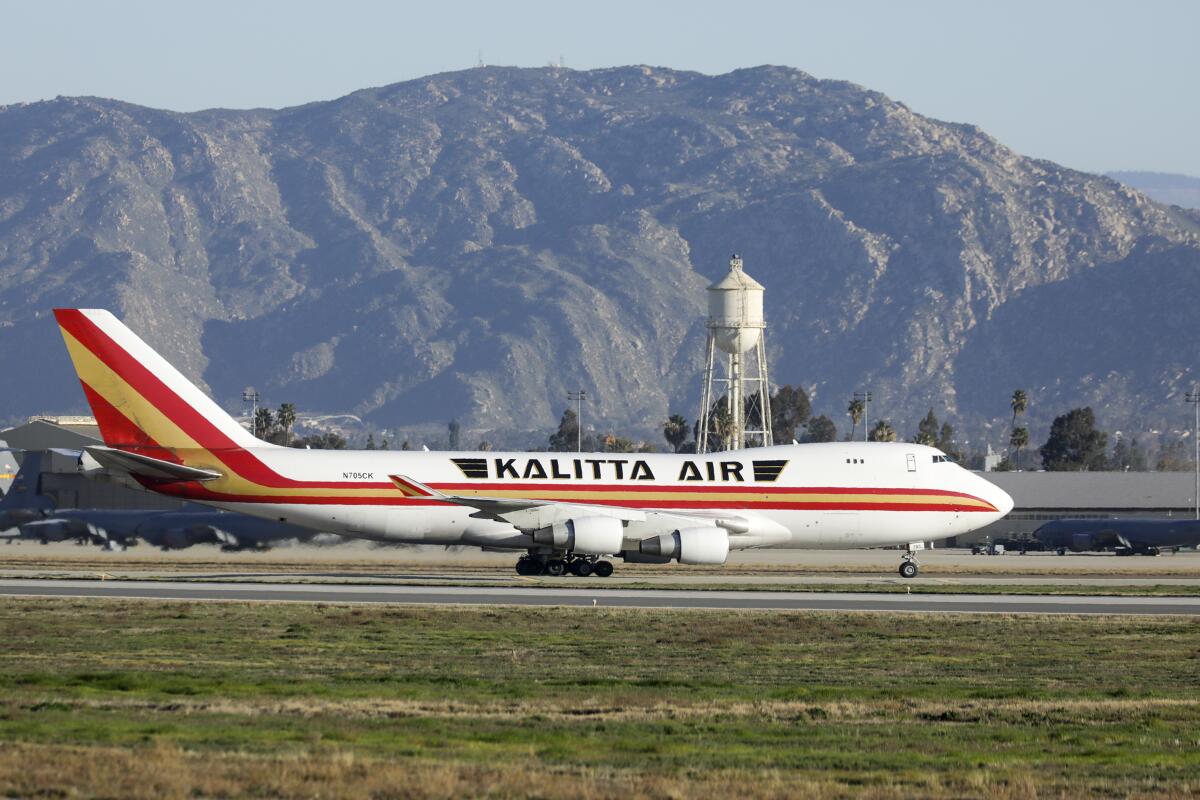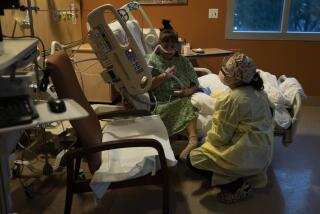Workers at coronavirus quarantine base accosted amid unfounded fears of spreading virus

- Share via
Workers at March Air Reserve Base and their families have been verbally attacked in person and on social media by people fearing their proximity to the 195 Americans under quarantine at the base after fleeing China amid the coronavirus outbreak, Riverside County officials said Monday.
“Please understand that people on and off the base are not at increased risk for exposure to the new virus, and we don’t restrict people who don’t actually pose any risk,” public health officer Dr. Cameron Kaiser said in a letter to the community.
“They have had no contact with the evacuees, whose area is fully separated from base personnel. You do not need to exclude household or family members of MARB personnel, nor do you need to require them to obtain unnecessary ‘clearance letters’ from a physician or health authority. They pose no greater risk than anyone else.”
Kaiser said that some base workers have been accosted while in uniform.
To date, no one at the base has tested positive for the novel coronavirus, including two children who were hospitalized for fevers and have since tested negative for the virus. Only 13 cases have been confirmed in the U.S., seven of which are in California.
The situation is a bit different in San Diego County, where 232 American citizens and their family members are serving the 14-day government-mandated quarantine after arriving at Marine Corps Air Station Miramar last week.
Late Monday, the Centers for Disease Control and Prevention notified San Diego health officials that a botched test result allowed an evacuee infected with the coronavirus to leave a San Diego hospital earlier in the day after initially saying the person was in the clear.
The error was detailed in a brief statement released by UC San Diego Health, which says that all four quarantine patients admitted to its isolation units last week were discharged back to quarantine quarters after the CDC said the coronavirus tests came back negative.
A coronavirus infection can have common symptoms like a cough or fever. There can also be serious problems, including pneumonia or kidney failure.
“The confirmed positive patient was returned to UC San Diego Health for observation and isolation until cleared by the CDC for release,” the statement said.
The university also said that it had received another patient with possible coronavirus symptoms, bringing the total hospitalized out of Miramar quarantine to eight.
The two patients in isolation units at UC San Diego facilities are said to be “doing well” with “minimal symptoms.”
In Riverside, Kaiser said that officials do not expect any positive cases to surface among the group there, which landed at March Air Reserve Base on Jan. 29.
Unlike medical staff, including healthcare workers from the CDC and nurses from Riverside University Health System-Public Health, base workers have not been in direct contact with the group, which has been placed under a 14-day quarantine. The CDC has previously said that quarantined individuals do not pose a threat to the larger community.
The CDC mandated a quarantine — the first in more than 50 years — on Jan. 31 for those fleeing the epicenter of the virus in Wuhan, China. The order, which did not align with the World Health Organization’s recommendation advising against travel bans, has prompted health workers to scramble and stirred panic within communities.
There is no clear explanation for why the U.S. government issued a mandatory quarantine. While a quarantine is one of the only tools that may help mitigate the spread of the virus, as no vaccine exists, experts have said it’s difficult to measure the effectiveness of a modern-day quarantine — a practice developed in the 14th century in Italy to prevent plague epidemics from spreading to coastal cities from ships that had returned to port in Venice.
The coronavirus outbreak was confirmed before it hit American soil, unlike the 2009 H1N1 influenza, commonly known as the swine flu — a disease that infected more than 60 million and killed more than 12,000 in the U.S. but did not result in a mandatory quarantine order. Dr. Nancy Messonnier, director of the CDC’s National Center for Immunization and Respiratory Diseases, said that while a quarantine is unprecedented, officials hope it will keep the virus contained, as it’s believed to be traveling directly from China.
Politics also could have something to do with the decision, said Jennifer Nuzzo, senior scholar at the Johns Hopkins Center for Health Security.
“I do believe that politics played a role in our decision to implement these quarantines and travel [restrictions]. It’s not what health officials were talking about a few days earlier,” she said, adding that politicians’ calling on the government to expand efforts is a “knee-jerk” reaction whenever a new virus emerges.
The State Department has said that more than 800 people have been evacuated from Wuhan. The majority have remained in quarantine at facilities in California tapped by the Department of Defense.
San Diego Union-Tribune staff writer Paul Sisson contributed to this report.
More to Read
Sign up for Essential California
The most important California stories and recommendations in your inbox every morning.
You may occasionally receive promotional content from the Los Angeles Times.










